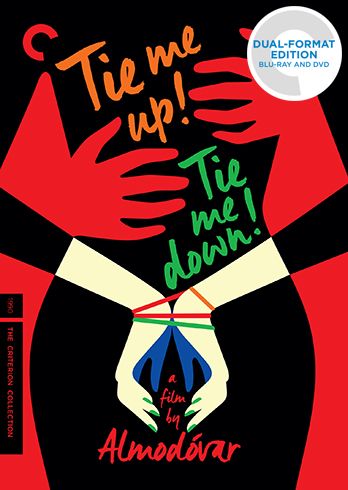Criterion has released two Spanish-language movies of a sexual nature, one from Mexico, one from Spain. The former is Alfonso Cuaron’s Y Tu Mama Tambien (which translates to “And your mother too”), which Criterion has been promising for five years, while the other is Pedro Almodovar’s Tie Me Up! Tie Me Down!, which was notorious for its NC-17 rated content at the time. My review of both Criterion editions of these films follow after the jump.
Y Tu Mama Tambien came after Cuaron had been courted by Hollywood in the nineties, and after he had made two studio movies that he’s since come to express some disappointment about how they turned out. It’s quite possible that Cuaron -- had he not hit this breaking point -- would have transformed into a studio hack. But he wanted to do something different, something that would re-energize his love of moviemaking, and that move launched him into superstar status as a director, as he followed Tambien with Harry Potter and the Prisoner of Azkaban, Children of Men and Gravity.
Gael Garcia Bernal and Diego Luna star as Julio Zapata and Tenoch Iturbide, respectively. Julio is the more middle class of the two, while Tenoch’s family has connections to the president. Both live comfortable lives and as the film starts their girlfriends are heading off for a summer vacation abroad and both want to leave their boyfriends with a final sexual act (regardless of location). Sans girlfriends, the boys spend their summer lazing about, but at a wedding they meet Luisa (Maribel Verdú), who is not only out of their league but also married to Tenoch’s cousin. But they’re drunk and tell her about a great beachside location they plan to go to that summer.
Lusia, who sees through their horny antics, isn’t interested until she receives news from her doctor and after her husband confesses he’s had yet another affair. She then contacts the boys, and they head out on a road trip, even though the two boys made up the name of the location they mentioned as their destination (“Heaven’s Mouth”). While on the road the trio get to know each other, with both boys angling to sleep with Luisa without really understanding how that might work and how it might change the dynamic. Luisa, as the more experienced and aware of the two, finally sleeps with one, which leads to discord that reveals truths both boys have kept from each other, truths that keep coming out after Luisa decides to make things right by sleeping with the other.
Though focused on teenaged boys who would politely be described as consistently horny, the film is never from their perspective, and paints their juvenile (though active) views on sexuality as inherently childish. It also suggests that they may never evolve beyond that thinking, at least as long as they are friends. Cuaron covers this all with an eye on the backgrounds behind these reasonably affluent (and slightly oblivious) characters, as in the margins of the story are the cruel details of the class system that functions around them. The film succeeds because it’s a perfect portrait of intense friendship and sexual desire by including those margins, by suggesting the characters are living in a bubble where what they want is still unimaginable even when it actually comes true.
Though Cuaron would achieve different heights with his later works, after watching this again, it’s hard not to call it his masterpiece, perhaps also because cinema has become so demure about sexuality over the intervening years. This is honest and sexy in a way that makes it just as powerful today as it was when it was released over a decade ago.
Criterion presents the film on one Blu-ray disc and on two DVDs. The film is widescreen (1.85:1) and in DTS-HD 5.1 Master Audio in a stunning presentation, perhaps as to be expected of its recent remastering in 2K supervised by cinematographer Emmanuel Lubezki and approved by Cuaron. Picture quality is flawless and the surround track is solid. Though there’s no commentary, there are a number of supplements, which kick off with a “Then” (11 min.) and “Now” (41 min.) look at the making of the film, with comments from Cuaron, cowriter Carlos Cuaron, Bernal, Luna and Lubezski (though he’s only featured in the “Them”). The latter proves more substantial, and the distance gives everyone involved more perspective, but both are engrossing.
There’s a behind the scenes making of (22 min.), done in a playful style and was made during the film’s production, while there are also three negligible deleted scenes (4 min.). It’s followed by an interview with Slavoj Zizek (9 min.), who offers his thoughts on the movie and its political ramifications. Also included is the film’s theatrical trailer, a TV spot, and Carlos Cuaron’s short film “You Owe Me One” (12 min.) which shows a father, wife, daughter, the servant and the daughter’s boyfriend all engaged in sexual couplings. It’s a strong piece of work, and smart and funny that reminds of many pre-code comedies (though much more overtly sexual), and suggests there’s a lot of talent in the Cuaron family.
In Tie Me Up! Tie Me Down! Pedro Almodovar casts Victoria Abril as Marina Osorio, a former porn star and smack addict who’s gone mainstream and is currently starring in a horror movie directed by Máximo Espejo (Francisco Rabal). Former mental patient Ricky (Antonio Banderas) has fallen in love with her, and so after her last day of shooting, he goes to her house and kidnaps her, tying her up and keeping her on a short leash. To do so at first he must hit her a couple of times, though he tells her they won’t have sex until they fall in love. Eventually she falls for him, though they both have to try to keep her kidnapping a secret from the outside world.
Though there are things to recommend about the movie, Almodovar is only slightly interested in the Stockholm syndrome aspects of the film (he does give them enough lip service that the film isn’t completely creepy), so it’s hard to know how to take a film that suggests this is a twisted love story. Unpacking the narrative (which earned an NC-17 rating because it shows Abril masturbating), the film is at its most interesting when it engages in Hitchcockian bits of suspense and dramatic irony, or when it’s all about the film within the film.
Perhaps in the context of the time that it was made, the rape-y aspects of the movie were dismissible, and the film was seen as a kinky love story that was breaking taboos (there are some people who don’t mind being tied up, and would not protest if it was Antonio Banderas who was doing the kidnapping), though Victoria Abril’s character’s turn from being victim to feeling compassion and wanting to have sex with Banderas seems obligatory, which ruins the thrust of the film. If there was more of a sense that Almodovar was commenting or at more of a distance, it might work better and there are moments where that comes out, but the director doesn’t seem to be unpacking his ideas. Technically, the film is a marvel, and Almodovar is rightly hailed as a master of craft. But in terms of the politics and what he’s after, it seems hopelessly dated.
Criterion presents the film on both DVD and Blu-ray in widescreen (1.85:1) and in 5.1 DTS-HD Master Audio. The film is preserved well by the company, and the transfer is excellent across the board. As for supplements there’s the brand new making of “United! Reflections on Tie Me Up! Tie Me Down! (29 min.), which features commentary by Pedro Almodovar, stars Banderas, Abril, Rossy de Palma and Loles Leon, executive producer Agustin Almodovar, cinematographer Jose Luis Alcaine, and director of production Esther Garcia, who are mostly happy with the movie. Given his own interview is Sony Pictures Classics co-founder Michael Barker (15 min.), whose company has been the home for Almodovar’s films for the last fifteen years. There’s also a conversation between Banderas and Almodovar from 2003 (26 min., likely an extra on a previous release), footage from the film’s 1990 premiere (4 min.) and the film’s trailer.






